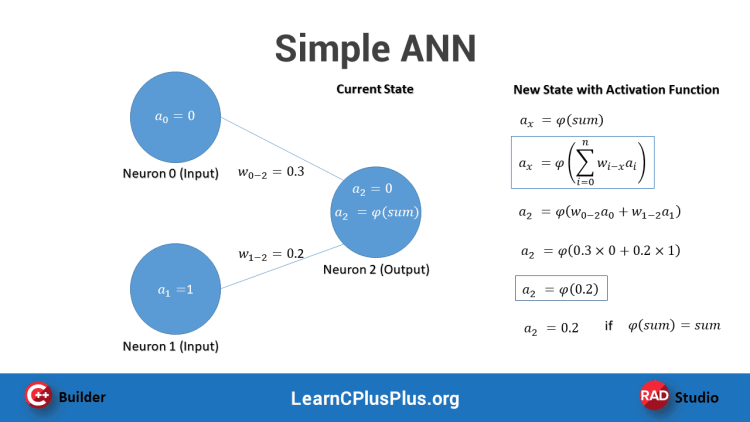
In this post, we will try to explain how to simulate a very simple artificial neural network in C++ and this is a good introduction to Artificial Intelligence Technologies. Artificial Intelligence is being widely explained well in Computer Science and many other disciplines, when we search simple examples in C++ it is really hard to find simple examples. The main aim of this post is to give an AI example in C++ as simple as possible and this post is also a good example of an introduction to Neural Network (ANN).
Very Simple Artificial Neural Network Example in C++
Here below we prepared a a very simple Artificial Neural Network example with an Activation Function given,

In this ANN example we have 2 input neurons and one output neuron. Neuron 0 and Neuron 1 are connected with Neuron 2. Each neuron will have their activation value (a) and each of the links between neurons will have weights. So output neuron will be the result of activation of the sum of 2 input neuron activations multiplied in their weights.
Output of the neuron may have a value in this current state. We should calculate it’s new activation value by the activation function phi(). Let’s define a simple linear activation function
|
1 2 3 4 5 6 |
float phi(float sum) { return sum ; // linear transfer function f(sum)=sum } |
Here we assume that our network was trained before, that means weights of net links are known. Let’s define and initialize our all neural activation and weight values,
|
1 2 3 4 5 |
float a0 = 0.0, a1 = 1.0, a2 = 0; float w02 = 0.3, w12 = 0.2; |
Note that, the number of neural net links are not same with number of neurons. That means, links and weights can be handled in another array. We defined a2 before and we set it to 0 which is not correct in this network, our ANN should be stable, correct ! So we need to calculate the activation value of the output with these inputs. We should use our activation function with the sum of incoming signals in their weights.
|
1 2 3 |
a2 = phi(a0*w02 + a1*w12); |
As you see, this simple equation shows that activation value of an artificial neuron depends on activation values of input neurons and weights of input links.
We think that, this example above was the simplest artificial neuron and ANN example in C++ on the internet. It is good to understand how a simple neuron simulation works. Let’s sum all in this full example below,
|
1 2 3 4 5 6 7 8 9 10 11 12 13 14 15 16 17 18 19 20 21 22 23 24 25 26 27 28 |
#include <iostream> // let's define a transfer function (or threshold) for the output neuron float phi(float sum) { return sum ; // linear transfer function f(sum)=sum } int main() { //let's define activity of two input neurons (a0, a1) and one output neuron (a2) float a0 = 0.0, a1 = 1.0, a2 = 0; //let's define weights of signals comes from two input neurons to output neuron (0 to 2 and 1 to 2) float w02 = 0.3, w12 = 0.2; // Let's fire our artificial neuron to obtain activity by the transfer function, output will be std::cout << "Firing Output Neuon ...\n" ; a2 = phi(a0*w02 + a1*w12); std::cout << "Output Neuron Activation Value:" << a2 << '\n'; getchar(); return 0; } |
Get started building powerful apps with C++Builder!
Design. Code. Compile. Deploy.
Start Free Trial
Free C++Builder Community Edition

